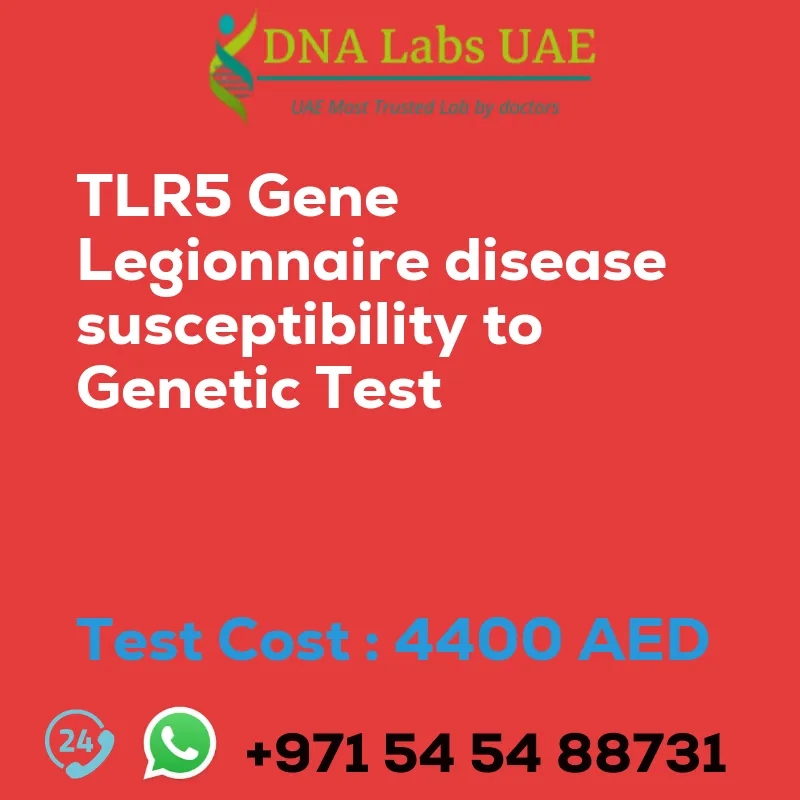TLR5 Gene Legionnaire Disease Susceptibility Genetic Test
Test Name: TLR5 Gene Legionnaire Disease Susceptibility Genetic Test
Components: TLR5 Gene Legionnaire Disease Susceptibility Genetic Test
Price: 4400.0 AED
Sample Condition: Blood or Extracted DNA or One drop Blood on FTA Card
Report Delivery: 3 to 4 Weeks
Method: NGS Technology
Test Type: Cardiovascular Pneumology Disorders
Doctor: Cardiologist
Test Department: Genetics
Pre Test Information: Clinical History of Patient who is going for TLR5 Gene Legionnaire Disease Susceptibility NGS Genetic DNA Test. A Genetic Counselling session to draw a pedigree chart of family members affected with TLR5 Gene Legionnaire Disease Susceptibility NGS Genetic DNA Test gene TLR5.
Test Details
The TLR5 gene is responsible for producing a protein called Toll-like receptor 5, which plays a crucial role in the immune system’s response to bacterial infections. Mutations or variations in the TLR5 gene can affect its function and lead to increased susceptibility to certain diseases.
Legionnaire disease, also known as Legionnaires’ disease, is a severe form of pneumonia caused by the bacterium Legionella pneumophila. It can be acquired by inhaling contaminated water droplets or aerosols. While Legionnaire disease can affect anyone, individuals with compromised immune systems or certain genetic variations may be more susceptible to infection.
NGS (Next-Generation Sequencing) genetic testing is a method used to analyze multiple genes simultaneously and identify variations or mutations that may be associated with certain diseases or conditions. In the case of Legionnaire disease susceptibility, NGS genetic testing can help identify variations in the TLR5 gene that may increase an individual’s risk of developing the disease.
By analyzing the TLR5 gene through NGS genetic testing, healthcare providers can assess an individual’s susceptibility to Legionnaire disease. This information can be used for risk assessment, prevention strategies, and potentially personalized treatment plans. It is important to note that genetic testing results should always be interpreted in conjunction with clinical evaluation and other factors, as genetic variations alone may not guarantee the development of a particular disease.
Genetic counseling is recommended to discuss the implications and limitations of genetic testing and to understand the significance of the results.
| Test Name | TLR5 Gene Legionnaire disease susceptibility to Genetic Test |
|---|---|
| Components | |
| Price | 4400.0 AED |
| Sample Condition | Blood or Extracted DNA or One drop Blood on FTA Card |
| Report Delivery | 3 to 4 Weeks |
| Method | NGS Technology |
| Test type | Cardiovascular Pneumology Disorders |
| Doctor | Cardiologist |
| Test Department: | Genetics |
| Pre Test Information | Clinical History of Patient who is going for TLR5 Gene Legionnaire disease, susceptibility to NGS Genetic DNA Test. A Genetic Counselling session to draw a pedigree chart of family members affected with TLR5 Gene Legionnaire disease, susceptibility to NGS Genetic DNA Test gene TLR5 |
| Test Details |
The TLR5 gene is responsible for producing a protein called Toll-like receptor 5, which plays a crucial role in the immune system’s response to bacterial infections. Mutations or variations in the TLR5 gene can affect its function and lead to increased susceptibility to certain diseases. Legionnaire disease, also known as Legionnaires’ disease, is a severe form of pneumonia caused by the bacterium Legionella pneumophila. It can be acquired by inhaling contaminated water droplets or aerosols. While Legionnaire disease can affect anyone, individuals with compromised immune systems or certain genetic variations may be more susceptible to infection. NGS (Next-Generation Sequencing) genetic testing is a method used to analyze multiple genes simultaneously and identify variations or mutations that may be associated with certain diseases or conditions. In the case of Legionnaire disease susceptibility, NGS genetic testing can help identify variations in the TLR5 gene that may increase an individual’s risk of developing the disease. By analyzing the TLR5 gene through NGS genetic testing, healthcare providers can assess an individual’s susceptibility to Legionnaire disease. This information can be used for risk assessment, prevention strategies, and potentially personalized treatment plans. It is important to note that genetic testing results should always be interpreted in conjunction with clinical evaluation and other factors, as genetic variations alone may not guarantee the development of a particular disease. Genetic counseling is recommended to discuss the implications and limitations of genetic testing and to understand the significance of the results. |








